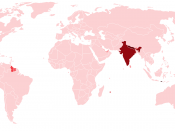In spite of the fact that Hinduism lacks a uniting belief system, it is considered one of the oldest religions in the world. "Hinduism is not a single doctrine, and there is no single founder or teacher" (BBC Religion & Ethics, 2006). This religion embraces many aspects of philosophy, theology, and mythology. In fact, it is made up of diverse beliefs and traditions, which include ethics and duties referred to as Dharma, rebirth or the concept of reincarnation called Samsara. There are many facets of Hinduism; yet Hindus venerate the ancient scriptures called Vedas. A superior God of this religion is known as Brahman, a complete reality, which is infinite and formless.
Hinduism endeavors to give recognition to several principles and practices, which enables people to become more devout human beings and encourages them to live in harmony with Dharma. Dharma is an important concept of the Hindu religion, since it signifies the path of knowledge and correct actions.
The religion places emphasis on living according to Dharma; as a result, a person who strives for spiritual knowledge is considered a follower of SanÃÂtana Dharma. Various schools of thought exist within Hinduism and many Hindu scholars have made significant contributions to the study of this religion.
"Hinduism originated around the Indus Valley near the River Indus in modern day Pakistan" (BBC Religion & Ethics, 2006). The religion had its beginnings in South Asia and among the inhabitants living around the Indus River. Hinduism has played a major role in developing the present day culture of India. Moreover, the strong beliefs and practices of the Hindu people have enabled them to maintain economic and agricultural development. The caste system of the Hindu religion still directs the lives of people in modern India. The working of society included a clear division of...


